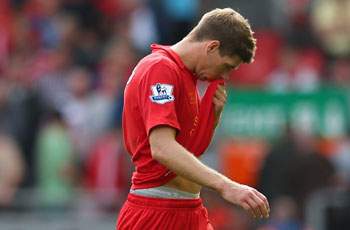COMMENT
By David Lynch
Thursday’s press conference marked the start of a big week for England and the true beginnings of what will be known in time – and for better or worse – as the Roy Hodgson era.
Though the affable 65-year-old led the Three Lions into Euro 2012, a lack of preparation time and the fact that qualification had been secured by a different man reduced the summer’s work to little more than a throw of the dice, a make do and mend effort. Against Moldova on Friday though, Hodgson’s reign truly begins, as does the anticipation that things will be better this time around.
However, despite the hope such situations offer and the now unavoidable optimistic soundbites which settle sweetly in willing journalists’ ears, it is hard not to feel that this Three Lions squad marks anything but a fresh start. As captain, a 32-year-old Steven Gerrard remains the face of this generation of England’s finest, a group which still contains the likes of John Terry, Ashley Cole and Frank Lampard.
These are familiar names marred by failure, scars most evident on the skipper, perhaps the most talented of a bunch once dubbed ‘the Golden Generation’. Unlike many of his compatriots though, Gerrard now finds himself at an important juncture in his career for his club too, and facing a potentially long and arduous journey on both counts.
Liverpool are in the midst of bedding in an entirely new set of ideals as Brendan Rodgers’ tiki-taka influence seeps slowly back into a club which once pioneered a continental attitude to football in England.
| MARATHON MAN |
|
|
|
|
| GERRARD’S APPEAREANCES PER SEASON |
|
| 2007-08 2008-09 2009-10 2010-11 2011-12 |
54 60 50 35 29 |
Unfortunately, on the evidence of the three Premier League games played thus far, this learning process will be as difficult for Gerrard as any other player the club currently possess. Talented he may be, but stuck in his ways as an all-action player in a side which requires patience? Most definitely.
That this education must take place whilst questions are constantly raised about his suitability for the system and dubious fitness record makes life even more difficult for the Huyton-born midfielder.
As for England, Gerrard spent much of his pre-match press conference discussing the need for patience in attempting to break down European minnows Moldova on unfamiliar territory on Friday. The irony of this declaration for a man who, realistically, has little time left in his career appeared to have been lost.
Gerrard’s words were indicative of a player who is still looking to Brazil 2014 as his last chance of glory, unaware that his chances of doing so are already compromised by his ageing body. In truth, given the task facing him on Merseyside, the midfielder has little hope of splitting his priorities effectively to give both sides the player they need.
Therefore, Gerrard must surely now make a decision, one which the club who pay his wages will doubtless be favourites to benefit from.
The expectation that weighs down on Gerrard at Anfield appears to now burden him every time he takes to the field with England as skipper, but it is the physical effects of continuing his international career which are the biggest cause for concern. At 32 he does not need to be chasing the ball in a tactical set-up which does not monopolise possession and for a team which will take him to countless European backwaters in the pursuit of success.
His perseverance may be viewed as admirable but now is the time for a player whose career has been defined by moments of selfless sacrifice to take of care of himself. Playing at right-back in a Champions League final earned him this, as did single-handedly denying West Ham a famous FA Cup final success, and there are countless other examples which should preclude Gerrard from accusations of self interest in the event of him withdrawing his services from England. Sadly, given the nature of football fans, they will not.
Of course, Gerrard need only look down the East Lancashire Road at Paul Scholes and Ryan Giggs, two players he has often professed his admiration for, as examples of the career-lengthening benefits of an early retirement from international football. And, though it might not seem like it now, this could also be a move which even benefits England in the long term.
The likes of Jack Wilshere, Tom Cleverley and Jordan Henderson see their path to the first team currently blocked by two players the wrong side of 30, meaning that by the time they break through, their learning curve will be irretrievably steep.
Jonjo Shelvey’s stellar performance for the Under-21 side on Thursday and his increasingly mature contributions at Anfield also mark him out as Gerrard’s natural successor on both counts. To be allowed to do so at international level now will ensure he can play a vital role in South America in two years time and to greater effect much further down the line.
So, like a difficult break-up, Gerrard’s international retirement will undoubtedly cut deep for all parties in involved in the short term. Yet, if all concerned are to truly flourish, then they must seek to end a relationship which has at times resembled a loveless marriage.

